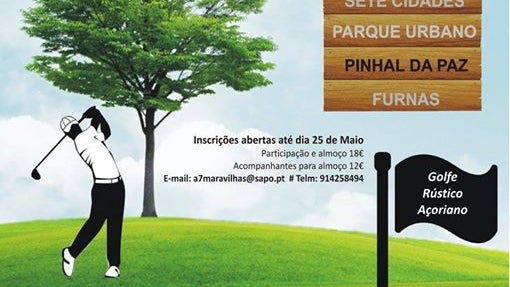Rustic Golf
Golf in the Azores paradoxically has an enormous past ahead of it, or a enormous future behind it.
I ask: why more golf courses, when these islands themselves are natural golf courses? Why the use of fertilizers that just deplete our soils?
In a time of globalization, mass consumption and economies of scale, we must not lose sight of this undisputable fact: the Azores possess one of the richest ecosystems in the world. And does any doubt still remain that the future of these islands necessarily lies with organic farming and ecotourism?
So I side with those true believers who, after taking into account what is done in other countries more developed than ours, had the amazing idea to encourage a unique way to play golf without affecting our islands’ environment: rustic golf, practiced in pastures and areas of tangled vegetation.
One of these enthusiasts is my Terceira friend Gilberto Vieira, president of the Associação de Turismo em Espaço Rural [Association for Tourism in Rural Environment] or ATER, for whom rustic golf is “cheap, ecological and imaginative,” yet not meant to replace classic golf played on its own courses.
We are Portuguese, and as is well-known, lack of means stimulates our creativity and hones our ingenuity. Anyone who served in the military has learned this: any strategy is good if the results are.
Well, rustic golf is the result. After highly successful experiments on the islands of São Miguel, São Jorge, Flores, Pico and Corvo, now it was the turn of the “Blue Island” of Faial to encounter this new type of sport.
First of all, rustic golf promotes healthful physical exercise and provides a recreational activity for its practitioners in a rural setting.
On the other hand, rustic golf fosters conviviality, a good mood and bonds of friendship among players, who are in intimate contact with Nature – that is to say, with the charm, seduction, harmony and allure of these islands that are beautiful and welcoming.
This also means that rustic golf is a way to promote the Azores region and it could become a new element of tourist activity, complementing and diversifying the archipelago’s tourism offerings.
Rules for Azorean rustic golf are very similar to those of traditional golf, the major differences being the locale of the event (pastures, instead of the usual greens of golf courses) and the holes – in this version they are replaced by nine or eighteen flags plus circles drawn on the grass. As for the rest, it is played with the same equipment (one or two clubs), but without the rigor or formality of traditional golf.
All things considered, this hitting of golf balls on land occupied by livestock, crops and in other rural areas is a return to the popular origins of golf – which, before its adoption by elites, was practiced by Scottish shepherds who, to break up long hours of idleness on the links (sandy soils), made use of their staffs to hit balls consisting of goose feathers wrapped in leather.
Apparently, rustic golf has been gaining more and more followers in the Azores. No wonder. There is no lack of holes…
NOTE:
1.Victor Rui Dores: “Golfe Rústico” (originally published in Diário Insular, 13 July 2014):
http://www.diarioinsular.com/version/1.1/r16/?cmd=noticia&id=61512
2.This column’s author, Victor Rui Dores, was born on the island of Graciosa in the Azores. A graduate of the University of Lisbon in Germanic languages, he teaches high school in Horta, Faial, where he is also involved in a wide range of cultural activities. The author of several books, he is a poet, novelist, short story writer, essayist, columnist, literary critic, and in recent years has dedicated himself to ethnomusicology and linguistics. He contributes regularly to newspapers, radio and television in both the Azores and their overseas communities, and he participates in theater activities as an actor and director. Since 1998 he has been the Azores’ representative to the National Council of Education.
3.Translator Katharine F. Baker is of Flores and São Jorge descent on her father’s side. She graduated from the University of California-Berkeley, earned a Master’s degree at the University of Maryland-College Park, and studied Portuguese at the University of Pittsburgh in Pennsylvania. She translates Portuguese literature into English.
Tradutora Katharine F. Baker é de origens florentina e jorgense no lado paterno. Formou-se na Universidade da California-Berkeley, ganhou um Mestrado na Universidade de Maryland-College Park, e estudou Português na Universidade de Pittsburgh na Pennsylvania. Traduz literatura portuguesa a inglês.




